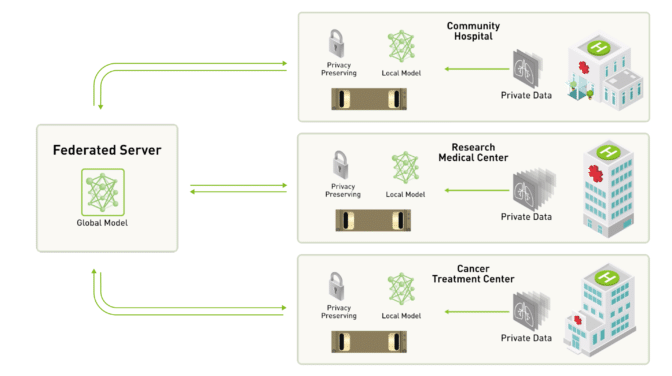







Federated learning is a way to develop and validate AI models from diverse data sources while mitigating the risk of compromising data security or privacy, as the data never leaves individual sites.

Federated Learning is simply the decentralized form of Machine Learning. In traditional machine learning approaches, we usually train models on data that is aggregated from several edge devices like smartphones, laptops, etc., and brought together to a centralized server.
The learning process happens on this centralized data store, where machine learning algorithms like neural networks train themselves on the aggregated data and finally make predictions on new data.
However, in a federated learning system, the learning methods are distributed across the edge devices themselves.
Instead of centralizing the training data, only the model parameters are sent to individual devices like smartphones, where the learning process takes place locally on each device's data.
This decentralized machine learning approach has several advantages, including improved data privacy, reduced bandwidth requirements compared to sending raw data, and the ability to leverage insights from diverse data sources without directly accessing the raw data.
Open-source frameworks are emerging to facilitate the development and deployment of such federated learning architectures for training predictive models on decentralized data.

Federated learning still requires careful implementation to ensure that patient data is kept secure.
But it has the potential to tackle some of the challenges faced by approaches that require the pooling of sensitive clinical data.
For federated learning, clinical data doesn't need to be taken outside an institution’s own security measures. Every participant keeps control of its own clinical data.
As this makes it harder to extract sensitive patient information, federated learning opens up the possibility for teams to build larger, more diverse datasets for training their AI algorithms.
Implementing a federated learning approach also encourages different hospitals, healthcare institutions and research centers to collaborate on building a model that could benefit them all.
MELLODDY, a drug-discovery consortium based in the U.K., aims to demonstrate how federated learning techniques could give pharmaceutical partners the best of both worlds: the ability to leverage the world’s largest collaborative drug compound dataset for AI training without sacrificing data privacy.
King’s College London is hoping that its work with federated learning, as part of its London Medical Imaging and Artificial Intelligence Centre for Value-Based Healthcare project, could lead to breakthroughs in classifying stroke and neurological impairments, determining the underlying causes of cancers, and recommending the best treatment for patients.
Reference
https://blogs.nvidia.com/blog/what-is-federated-learning/
https://research.ibm.com/blog/what-is-federated-learning
